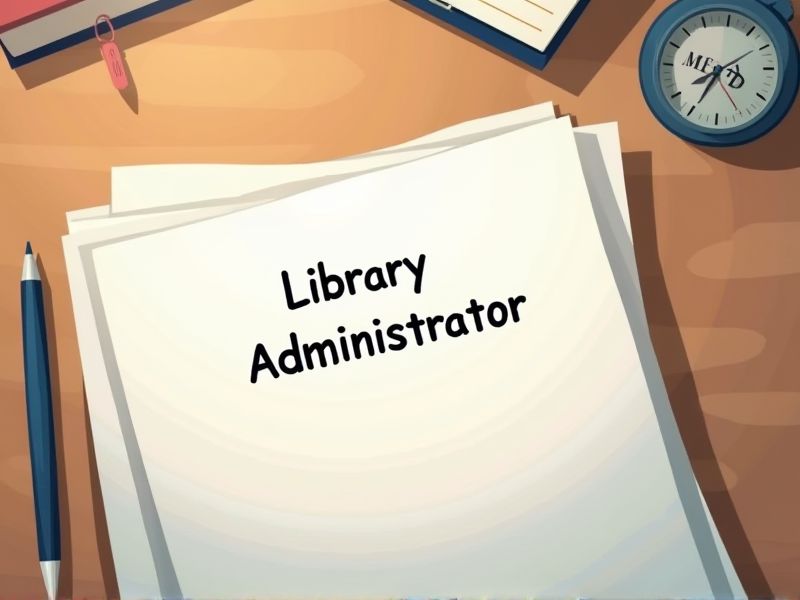
Library administrators oversee the operations of libraries, ensuring they run efficiently and meet the needs of the community. Certifications provide validation of skills in information management, leadership, and technology that are essential for effective library management. With evolving technologies and diverse patron needs, these professionals must continuously adapt and enhance their competencies. Here are essential certifications you might need as a library administrator.
Library Leadership Institute Certificate
Possessing a Library Leadership Institute Certificate equips a Library Administrator with enhanced leadership and management skills, directly impacting the efficiency and adaptability of library services. This certification often leads to increased credibility among peers and stakeholders, elevating the administrator's capacity to advocate for library needs effectively. It frequently provides insights into emerging industry trends and challenges, which empowers administrators to make informed strategic decisions. The certificate often fosters networking opportunities, allowing administrators to collaborate with a diverse set of professionals to share solutions and innovative ideas.
Certificate in Library Administration
A Certificate in Library Administration equips library administrators with essential skills in management and organizational strategies, leading to improved library operations. Without such certification, administrators may lack the structured approach needed to handle budgeting, staffing, and program development effectively. Certification also provides credibility, which can enhance stakeholder trust and boost career prospects. Libraries that employ certified administrators tend to have higher patron satisfaction due to efficient and informed decision-making.
Certificate in Information and Library Management
A Certificate in Information and Library Management equips a Library Administrator with specialized knowledge essential for effectively organizing and maintaining library resources. Mastery in this field enhances the ability to implement efficient cataloging systems, which directly improves user access and satisfaction. Understanding current information technologies and digital library tools fosters innovation and keeps libraries relevant in the digital age. Such certification often signifies a commitment to professional accountability, bolstering credibility and trust among stakeholders.
American Library Association Management Certificate
Acquiring an American Library Association Management Certificate enhances a library administrator's leadership skills critical for effective decision-making. This credential indicates proficiency in understanding and implementing innovative library policies and services. It assures stakeholders of the administrator's capability to manage complex library operations efficiently. Having the certificate often translates to increased trust and credibility among peers and community members.
Project Management Professional (PMP)
Implementing PMP principles enhances a library administrator's ability to efficiently manage large-scale projects, such as digitization initiatives or infrastructure upgrades. Enhanced project management skills can lead to improved resource allocation, ensuring that budgets and timelines are met without compromising quality. A PMP certification equips library administrators with standardized methodologies, which foster better communication and collaboration among team members. The structured approach gained from PMP training helps in mitigating risks and overcoming challenges during complex project execution.
Certified Records Manager (CRM)
The role of a Certified Records Manager (CRM) can enhance a library administrator's ability to efficiently manage and preserve important documents and records, ensuring regulatory compliance and adherence to industry standards. Expertise in records management helps streamline archival processes, improving accessibility and retrieval of information for both staff and patrons. Libraries face increasing data privacy concerns, and a CRM can implement effective data protection strategies to safeguard sensitive information. Technological advancements in digital recordkeeping necessitate the skills of a CRM to successfully integrate and maintain electronic records management systems in a library setting.
Certified Information Professional (CIP)
The Certified Information Professional (CIP) credential equips a Library Administrator with advanced skills in managing digital and traditional information assets, leading to more efficient resource management. With the rapid evolution of information technology, libraries face challenges in digital resource organization, and CIP certification ensures administrators are equipped to handle these. CIP certification fosters trust among stakeholders by demonstrating a commitment to best practices and standardized information governance. As libraries increasingly integrate technology, having CIP-certified administrators ensures alignment with current industry standards and promotes robust information management strategies.
Digital Archives Specialist Certificate
Library administrators face growing demands to manage digital resources effectively, making a Digital Archives Specialist Certificate increasingly vital. This certification equips administrators with the necessary skills to organize, preserve, and provide access to digital collections. As libraries integrate more technology, understanding digital archiving practices becomes critical for maintaining relevant and comprehensive collections. Libraries risk falling behind in information management without expertise in digital archives.
Certified Data Management Professional (CDMP)
Certified Data Management Professional (CDMP) certification equips library administrators with standardized data management skills, ensuring more efficient handling and organization of library resources. Libraries face increasing volumes of digital data, and CDMP training helps administrators implement modern solutions for effective data governance and information lifecycle management. With CDMP tools, library administrators can enhance data quality and consistency, which improves resource accessibility and user experiences. Adopting best practices from CDMP certification can lead to improved decision-making capabilities and strategic planning within the library ecosystem.
Information Security Management Professional (CISM)
The presence of a CISM-certified professional aids in developing robust security policies, ensuring the protection of sensitive patron data from unauthorized access. A library administrator can benefit from a CISM's expertise in conducting risk assessments, identifying potential vulnerabilities within digital and physical systems. As libraries increasingly digitalize, a specialized focus on information security becomes crucial to safeguard e-resources and digital archives. This certification also enhances trust among patrons, as they gain confidence that their personal information is being handled securely.
Summary
By obtaining certifications, you, as a Library Administrator, can enhance your professional credentials and increase your expertise in library management. Your improved skills may lead to more efficient operations and higher patron satisfaction. This certified knowledge can position you for potential career advancement or increased salary opportunities. The library's reputation might improve as you apply best practices learned through certification.
